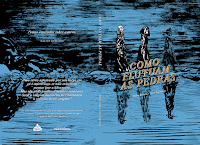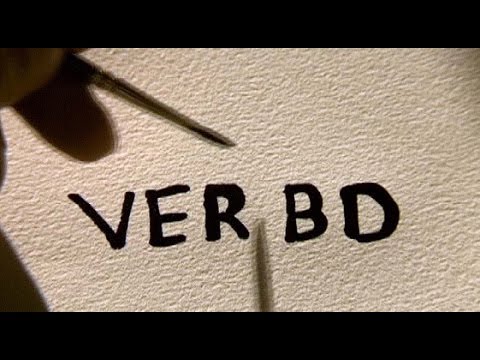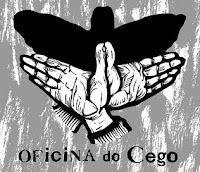 Fazendo parte de uma mailing list onde se trocam informações sobre banda desenhada e se tenta, mas as mais das vezes não se consegue, discutir um pouco mais academicamente alguns dos temas relacionados, enviei há muito pouco tempo um longo email, mais uma diatribe do que outra coisa qualquer, relativo a uma série intitulada Testament, escrita por Douglas Rushkoff e ilustrada por Liam Sharp. Muitas pessoas, secundando os appraisals que vêm na capa e contracapa do TPB, como manda a boa lei de mercado norte-americana, apontam esta como sendo uma nova "pedrada no charco", uma "série monumental", "recorda Sandman em amplitude"... Não concordando, enviei esta mensagem, que aqui apresento com pequenas alterações, acrescentos e correcções, mas não traduzida. (Mais)
Fazendo parte de uma mailing list onde se trocam informações sobre banda desenhada e se tenta, mas as mais das vezes não se consegue, discutir um pouco mais academicamente alguns dos temas relacionados, enviei há muito pouco tempo um longo email, mais uma diatribe do que outra coisa qualquer, relativo a uma série intitulada Testament, escrita por Douglas Rushkoff e ilustrada por Liam Sharp. Muitas pessoas, secundando os appraisals que vêm na capa e contracapa do TPB, como manda a boa lei de mercado norte-americana, apontam esta como sendo uma nova "pedrada no charco", uma "série monumental", "recorda Sandman em amplitude"... Não concordando, enviei esta mensagem, que aqui apresento com pequenas alterações, acrescentos e correcções, mas não traduzida. (Mais)
As mais das vezes, prefiro o silêncio a "dizer mal" (como muitas vezes é confundida a crítica pelos mais incautos), já que acredito, com outros, que as boas obras de arte contêm em si as regras da sua crítica, e as más votam-nos ao silêncio (vetam-se a si mesmas). Por isso caracterizo este texto mais como um "ataque", em prol de algum rigor do olhar e atenção para com a criação da banda desenhada, do que um texto estruturalmente crítico. Boa leitura.
"As in other occasions, I've been prompted by discussions or simple mentions in this list [comix scholars list] to read a couple of titles that I did not pick when at my local bookstore.
I have to say, right at the start, that Testament was a disappointment.
The premise of the book (and its promises) seemed interesting enough, intriguing even, and I have to confess that I was a little jealous of the theme, given I wrote and published three chapters of a ongoing project called "The Story of God", which tells a few biblical stories from the point of view of a very human-like God [refiro-me aos três episódios de A História de Deus, que fiz com o Marcos Farrajota, nos três números da Mesinha de Cabeceira/Crica, em 2006]. This is in Portugal, so don't bother trying to get them. It's crap, anyway. I am no scholar, but I've actually read a few Bible scholarly books (and even translated two so far, and looking into the third [refiro-me aqui a A Dinastia de Jesus, de James D. Tabor, pela Esfera dos Livros, e Abraão, de Bruce Feiler, no prelo da Saída de Emergência) from which I've stole a lot.
I was expecting something at least interesting. It was a surprise, but a bad one.
The first thing that I have to say is that the treatment of the gods is quite poor. After all, a little Manichaeism is always funny, but too much is too much. It's close to the ridiculous, actually. Ennis' Preacher was a high-octane, f-word tinted diss on God, but despite its juvenile overreactions, or precisely because of them, it became a very funny series. Jodorowsky and Moebius the Incal saga was also a little superficial in its structure – set the Marseille Tarot deck on the table and you'll see why – but it dealt with the old, old questions about the need for spirituality and all that jazz. Mr. Neil Gaiman is, within the North-American/English-speaking mainstream industry, the household name every time some one needs to quote "The return of God" in comics, and that's quite just, for he has revisited them all, or at least he has left the doors ajar for others to follow into that territory. And his gods are painfully, preposterously even, human (that's the point: showing their frailties). In 1994, Autrement (a very serious French publisher) issued a collection of "Histories graphiques", small anthologies with the best contemporary French-speaking authors (and a little beyond), one of which was called precisely Le retour de Dieu ("The return of God"), and you had small satires of the birth of Christ (J.-C. Menu), curious encounters with the Messianic Jewish movement (David B.), redemption through sin (Mattotti), and hallucinations through faith (M.-A. Mathieu). There's also the two books from Knockabout entitled Outrageous Tales from the Old Testament and Seven Deadly Sins (from 1987 and 1989 respectively) who played freely and foolishly with dogmas and stories from the Book of Books (Kim Deitch, Moore, Gaiman, Bolland, Hunt Emerson and Dave Gibbons are some of the authors). More recently, there was the bar-confined stories from "Testament" by Jim Krueger and Mario Ruiz (Metro Press, 2003), a more straightforward approach towards the adaptation of the Bible into comics, but still worth one's attention thanks to the very different graphic styles and the choices that are made with the material… This list serves nothing except to show, even if briefly and acritically, that the creation of interesting, strong books using the matter or religion(s) is not new and unachieved. Quite the contrary. And the list is limited to the only books I know/remember/have that dead directly with religious literature per se, as some sort of Hermeneutics-through-comics. If we dealt with religious issues, we could bring into the fore Chester Brown's books, Satrapi's dialogues with God, and oh-so-many-more!
None of these quickly-quoted books are the same in their approach to God(s). Some of them are better than the next for this or that reason. But I think I may say that none of them is reductive or simplistic, even when their goal is simply to make fun (as Alan Moore does with the Mosaic laws). Douglas Rushkoff is. To portray actual gods meddling with human affairs is of course something very, very old in the arts, the Greeks knew it already and used an expression that we know today as deus ex machina. Dear Aristotle, who still makes sense in many affairs of the world, considered this an "easy way out", a "deception" (of course I'm not quoting correctly!). Right on. It's a very comfortable way to knit a plot, where the only plot possible is the direct association of the events from Genesis with a contemporary set of Matrix-meets-Freedom-Act thing…
Moreover, these gods reek of Kirbian power and Claremont ethics. Moloch is a giant six-pierced-nipples (how cool, right?), fire-snorting'n'expelling bull, Yahweh is a sort of benevolent older "Bluestreak Superman" (actually yellow), and Astarte is a blue-tinted, trickster, two-timing Meretrix. Subtle is not an option anymore, then?
The parallel with present times is also very unsophisticated , the characters are dull – the sexist approach (both graphically and diegetically) to the Dinah character is plain awful (no, the connection with the Genesis' Dinah is weak) -, the conspirational politics is juvenile. I could go on. For instances, the use of the "gutter" is smart, yes, but not as powerful as Grant Morrison and his collaborators employ it in his books time and again at the most significant times. In Testament it's used so many times and in such a blatant manner that it stops being refreshing. One thing is being titillated now and then to our own selfish pleasure of discovery, another is being pounded again and again in the same brain spot until we're numbed by it.
I'll grant you all that this (mine, that is) is not a scholarly approach at all. I should plunge head on on the themes that are dealt with by the book and explain why I think it's weak. For instances, why I think that to depict the Akedah – the sacrifice of Isaac – as a battle of the gods is far less interesting than letting Abraham's pact, or covenant, with God take its turns and twists as a dialogue between two very strong personalities: to wit, Abraham's and God's. Moreover, to depict Abraham as a buffed-up Conan in the end, although helpful to depict him do in hordes of Amelekites and of the "giants" (again, literally so, praise Saint Bisley!), helps not at all in exploring his personality, even as a literary character. I cannot help but encourage you to read Bruce Feiler's Abraham, although not a Bible scholar book, a good place to start. With all due respect, when Beth Davies wrote in the second of the posted texts that "In the Bible, this story is relatively simple", I must ask, relative to what? To engage the Bible as a simple text without exploring its full meaning, word-per-word, is simply not reading it. And mind you, I mean this from a literary point of view, not a religious one at all. I respect people's options, but I am not a Bible-thumper or any of the sort. I just mean that this is an ordinary thing to say: the Bible is a powerful book (or books, actually) and one can create immensely powerful new stories from it (Thomas Mann and Nikos Kazantzakis, for instances). This comic series is not one of them.
But after reading beautiful English translations and commentaries of some of the Bible books by Robert Alter (my best reading experience of the Bible so far – in English, that is), along with , exploring the formation of the Three Monotheistic Faiths with Karen Armstrong, and following the many and different approaches to the Bible, the history of the Church, of the religions, of Christ, of personal accounts of experiences, of the conundrums and mysteries and actual data available, from people such as Robin Lane Fox, Scholem, Malinowski, Bruce Chilton, James Tabor, Bruce Feiler, and even The Resident's Wormwood album, and their marvellous/hideous show, and the comic books I've quoted in the beginning, Testament falls way short of any expectations I would have. Unfortunately, it seems that this book is precisely of that quality that makes non-comics readers say that something is "comic-bookish".
Yours faithfully ;)
P.V.M."
25 de março de 2007
Testament. Akedah. Douglas Rushkoff e Liam Sharp (Vertigo)
Publicada por
Pedro Moura
à(s)
6:32 p.m.
![]()
Etiquetas: EUA, Mainstream
Subscrever:
Enviar feedback (Atom)


















Sem comentários:
Enviar um comentário